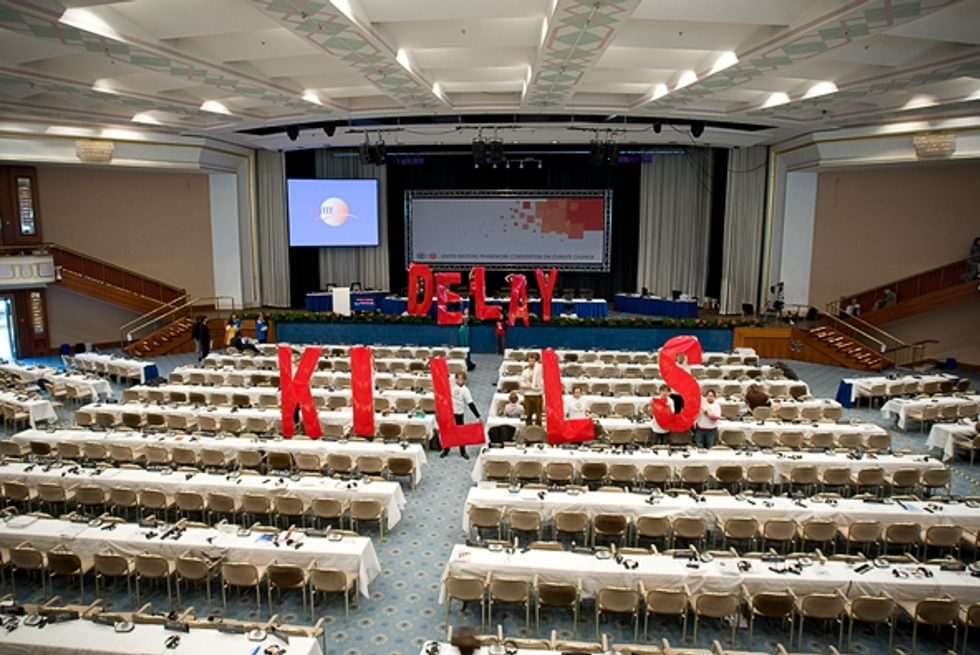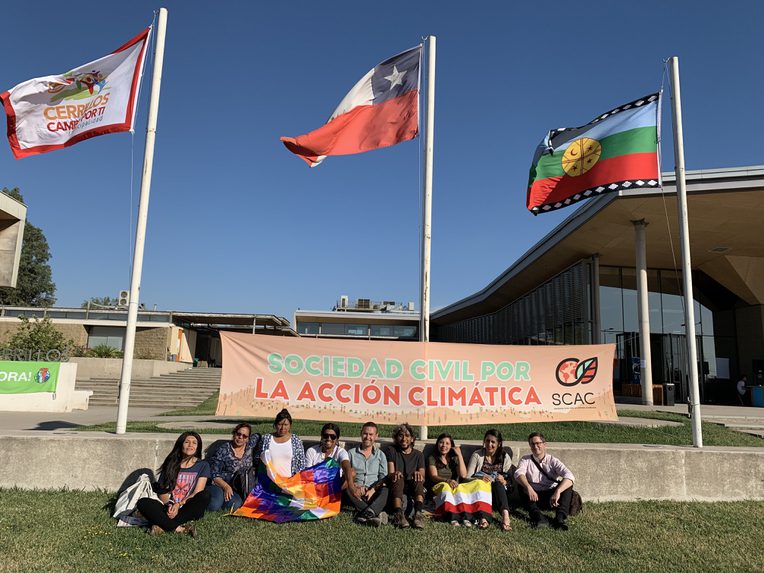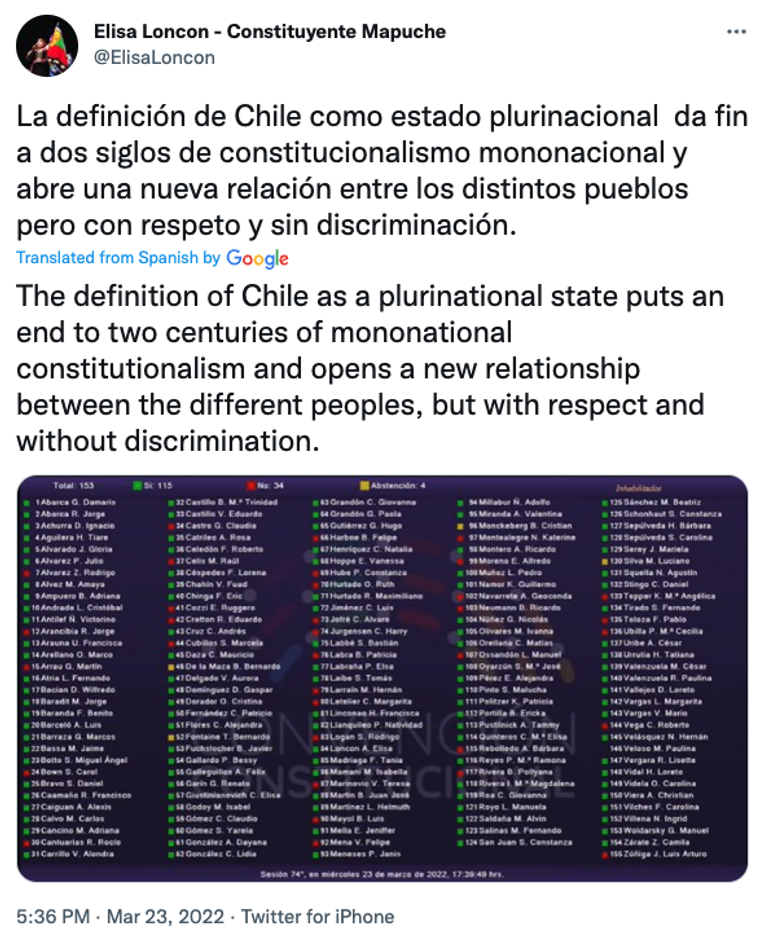Plurinational Climate Action: Environmental Governance Beyond Green Extractivism
From the Series: Negotiating the Crisis: Critical Perspectives on Climate Governance
From the Series: Negotiating the Crisis: Critical Perspectives on Climate Governance

In December 2019, Chile was scheduled to host the United Nations Framework Convention on Climate Change (UNFCCC)’s 25th Conference of the Parties (COP25) in Santiago. President Sebastián Piñera sought to showcase the country’s ostensible leadership in climate governance on a world stage. However, when mass protests—known as el estallido social (social outburst)—erupted against inequality in October 2019, Piñera declared “war” on his own citizens. Violent state repression followed, reminiscent of the neoliberal military dictatorship of Augusto Pinochet (1973-1989). As a result of this unrest, the official COP25 was moved to Madrid, Spain.

Amid the protests, the newly formed Civil Society for Climate Action (SCAC) and other grassroots organizations, such as the Cumbre de los Pueblos (People’s Summit) held a “Parallel COP” in and around Santiago in December 2019. Activists interrogated critical issues related to climate governance: water, nature, energy, Indigenous and women’s rights, and environmental justice. The events culminated in a “funeral” march led by ecofeminists, mourning the potential demise of the huemul deer and the condor, charismatic megafauna that appear on Chile’s national seal.
Parallel COP events were also held in other regions of Chile. In the northern town of San Pedro de Atacama, the Plurinational Observatory of Andean Salt Flats (OPSAL) and Tantí Foundation organized a community outreach workshop to raise awareness about the social and ecological harm of lithium extraction in the Puna de Atacama: a plurinational ecoregion located at the borderlands of what are now Argentina, Bolivia, and Chile. The Puna de Atacama has been labeled the “Lithium Triangle” by industry and state actors, but it is the ancestral territory of multiple Indigenous peoples, from Atacameño (Lickanantay) communities encircling the salt flats near San Pedro to Aymara and Quechua peoples, whose territory extends from Bolivia and Peru in the far north, to Colla and Diaguita peoples in Norte Chico, Chile, and northwest Argentina. Throughout this high-desert area, extractive industries operate in close proximity to protected wetlands that feature three species of flamingos and unique communities of microorganisms at risk of extirpation or extinction.
The international climate governance agenda is based on the idea that climate change mitigation requires a global transition from fossil fuels to renewable energy and electrified transportation. However, the growing demand for electric vehicles that rely on lithium-ion batteries has led to a boom in destructive mining for critical materials, such as lithium. The brine evaporation method of extracting lithium came under intense scrutiny at the Parallel COP for depleting groundwater and draining wetlands, raising questions about whether electromobility is the right form of climate action, or rather “green extractivism” (Jerez et al., 2021).
Lithium mining in the Atacama Desert was one of the primary cases considered at the 5th International Tribunal on the Rights of Nature, another event that was held in conjunction with the Parallel COP in Santiago with the participation of “post-extractivist” scholars Alberto Acosta and Maristella Svampa, among others (Acosta 2017). There, members of OPSAL and the Indigenous association Consejo de Pueblos Atacameños (CPA) decried how lithium brine evaporation is tantamount to water extraction. Nonetheless, in Chile, brine has been treated as a mineral and not as water. As a result, the mining industry has been mired in scandals over data transparency and corruption.
Drawing on our collaborative and engaged participant observation at the Parallel COP, we co-produced a report published by the Natural Resources Defense Council (NRDC). It interrogates how even though Indigenous peoples have long practiced forms of agro-pastoralism and irrigation well-suited to the extremely arid Atacama environment (and benefit sharing agreements do exist), the compounding problems of lithium and copper mining have resulted in barren groundwater aquifers that have been declared “exhausted.”
In 2021, the agreement reached at the COP26 recognized the need for a “just transition” to renewable energy. But outside COP26 in the streets of Glasgow and at another parallel People’s Summit for Climate Justice, Indigenous leaders and activists from areas impacted by extractive industries, including OPSAL, protested the myopic focus on electric vehicles, insisting “we can’t mine our way out of the climate crisis.”
Chilean citizens have already taken concrete actions to protect water and defend land in the Puna de Atacama. In the wake of the estallido social, a plebiscite was held in which the people of Chile voted 77.9 percent in favor of forming a convention to create a new constitution—with gender parity and Indigenous participation—which would replace the constitution rooted in the dictatorship. On October 4, 2021 the newly established Constitutional Convention, led by Dr. Elisa Loncon, an Indigenous Mapuche linguist, voted to declare a Climate and Ecological Emergency. The Constitutional Convention’s Commission on Systems of Knowledges, Cultures, and Science proposed by Dr. Cristina Dorador, an OPSAL member and microbiologist with expertise on the Atacama salt flats, has pursued epistemic justice and integration of local knowledge into environmental assessments. This alternate approach to climate governance has been designed to represent marginalized peoples as well as threatened nonhuman species, resulting in citizen-led constitutional proposals that would establish Chile as a plurinational, intercultural and ecological democracy, which protects both human rights and the rights of nature.

Just as the Constitutional Convention was starting to gain momentum, right before leaving office in 2021, Piñera’s government offered new licenses for lithium mining expansion. This international bid for the exploitation of 400,000 metric tons of lithium sparked a controversial legal battle as Piñera’s successor, progressive Gabriel Boric rose to power. In defiance, Indigenous communities objected to the lack of consent, leading to a Supreme Court decision to void two of the mining tenders. OPSAL members, including Atacameño/Lickanantay and Colla water protectors, have presented their case against green extractivism in front of the Constitutional Convention’s environmental commission. They worked tirelessly until the time of this publication to propose and reformulate specific articles that, if approved by a national plebiscite vote, would become unprecedented tools for a post-extractivist future.
Acosta, Alberto. 2017. “Post-Extractivism: From Discourse to Practice—Reflections for Action.” International Development Policy 9: 77–101.
Jerez, Bárbara, Ingrid Garcés, and Robinson Torres. 2021. “Lithium Extractivism and Water Injustices in the Salar de Atacama, Chile: The Colonial Shadow of Green Electromobility.” Political Geography 87.